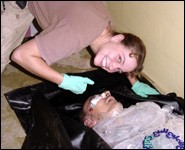An Iraqi whose corpse was photographed with grinning U.S. soldiers at Abu Ghraib died under CIA interrogation while suspended by his wrists, which had been handcuffed behind his back, according to investigative reports reviewed by The Associated Press.
The death of the prisoner, Manadel al-Jamadi, became known last year when the Abu Ghraib scandal broke. The U.S. military said back then that it had been ruled a homicide. But the exact circumstances of the death were not disclosed at the time. The prisoner died in a position known as "Palestinian hanging," the documents reviewed by The AP show. It is unclear whether that position - which human rights groups condemn as torture - was approved by the Bush administration for use in CIA interrogations.
Here's more:
Al-Jamadi died in a prison shower room during about a half-hour of questioning, before interrogators could extract any information, according to the documents, which consist of statements from Army prison guards to investigators with the military and the CIA's Inspector General's office.
One Army guard, Sgt. Jeffery Frost, said the prisoner's arms were stretched behind him in a way he had never before seen. Frost told investigators he was surprised al-Jamadi's arms "didn't pop out of their sockets," according to a summary of his interview.
Frost and other guards had been summoned to reposition al-Jamadi, who an interrogator said was not cooperating. As the guards released the shackles and lowered al-Jamadi, blood gushed from his mouth "as if a faucet had been turned on," according to the interview summary.
The military pathologist who ruled the case a homicide found several broken ribs and concluded al-Jamadi died from pressure to the chest and difficulty breathing.
There is no question that it is torture.
Dr. Vincent Iacopino, director of research for Physicians for Human Rights, called the hyper-extension of the arms behind the back "clear and simple torture." The European Court of Human Rights found Turkey guilty of torture in 1996 in a case of Palestinian hanging - a technique Iacopino said is used worldwide but named for its alleged use by Israel in the Palestinian territories.
So what happened to those responsible?
Navy SEALs apprehended al-Jamadi as a suspect in the Oct. 27, 2003, bombing of Red Cross offices in Baghdad that killed 12 people. His alleged role in the bombing is unclear. According to court documents and testimony, the SEALs punched, kicked and struck al-Jamadi with their rifles before handing him over to the CIA early on Nov. 4. By 7 a.m., al-Jamadi was dead.
Navy prosecutors in San Diego have charged nine SEALs and one sailor with abusing al-Jamadi and others. All but two lieutenants have received nonjudicial punishment; one lieutenant is scheduled for court-martial in March, the other is awaiting a hearing before the Navy's top SEAL.
The article continues with more about what happened to al-Jamadi. We wrote about the case last September, here.




